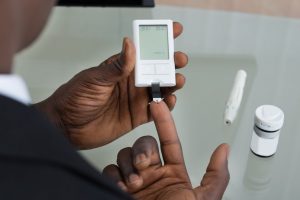 Diabetes is a condition in which a person has high levels of blood sugar, also known as blood glucose. Glucose enters your body through the foods you eat. Insulin is a hormone that helps your cells use your blood glucose for energy. Diabetes is caused by either faulty insulin production, or because the body’s cells do not respond properly to insulin, or both. Diabetes can be treated or controlled through diet, exercise, and medication. Over time, having high blood sugar levels can cause many health problems and can damage your heart, eyes, nerves, and kidneys. For financial assistance with managing your condition, see our page on Free & Discounted Services.
Diabetes is a condition in which a person has high levels of blood sugar, also known as blood glucose. Glucose enters your body through the foods you eat. Insulin is a hormone that helps your cells use your blood glucose for energy. Diabetes is caused by either faulty insulin production, or because the body’s cells do not respond properly to insulin, or both. Diabetes can be treated or controlled through diet, exercise, and medication. Over time, having high blood sugar levels can cause many health problems and can damage your heart, eyes, nerves, and kidneys. For financial assistance with managing your condition, see our page on Free & Discounted Services.
- Diabetes (MedlinePlus)
- Diabetes (The National Institute of Diabetes and Digestive and Kidney Diseases)
- Diabetes Basics (American Diabetes Association)
- Gestational Diabetes (American Academy of Family Physicians)
- Learning About Diabetes (Learning About Diabetes, Inc.)
- Type 1 Diabetes (Cleveland Clinic)
- Type 2 Diabetes (Cleveland Clinic)
Managing Diabetes can be a confusing experience for newly diagnosed patients and their caregivers. To learn about the specific kinds of providers that might make up your health care team, as well as the services, programs, support groups, and organizations that can help you manage, visit the Managing Diabetes page.
There are several options available for medicines for treatment and monitoring of Diabetes. The links below give an overview of what some of these choices are.
These sites allow patients to discuss their experiences with illnesses, treatments, and other health matters. Any information or opinions posted are those of the forum users themselves and are not a substitute for professional medical advice.
Mobile apps and tools give you easy-to-use information and resources that can help you get and stay healthy. For tips on choosing apps, see How to Choose a Good Health App by The University of Texas MD Anderson Cancer Center.
Track blood sugar, insulin, medication, food, and more. Get a summary for each day as well as your long term trends. Access your data from your desktop, mobile app, or tablet. Free. iOs, Android. Additional features available in the paid version.
Glooko syncs data with most blood glucose meters to keep track of carbohydrate counts and medicine usage, diet and exercise. Users can set personal reminders for meals and medication. Handy charts to show real-time events and trends which can be shared with doctor. Free, though some glucose meters require a sync cable to transfer data, which is sold separately. iOs, Android
Spot trends and patterns in your numbers. Type 2 diabetes education you’ll enjoy. Instantly synchronize data from your FreeStyle Libre or Medtronic CGM into mySugr App with the mySugr Web Importer. Free. iOs, Android. Additional features available in the paid version.
Log glucose, insulin, food, medications, and more. View analytical charts. Basic features are free. Subscription version includes Bluetooth integration to sync data from your glucose meter. iOs, Android.
Resources selected by Lisa Kilburn, Southern Regional AHEC.
Last reviewed December 24, 2024
